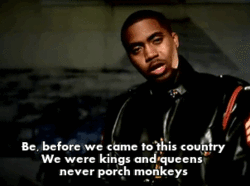.༼-◕_◕-༽.
.༼-◕_◕-༽.
The Scalia thread got me feelin some type of way... There are some undercover a$$holes trying to spread the horseshyt about Black achievement, intelligence etc.
It's been MY experience that Black people from ALL walks of life have supreme intelligence. Beyond the traditional measurements of "standardized tests" and other bullshyt. I've seen it repeatedly THROUGHOUT every type and kind of Black community. North/South/East/West/domestic/international
Black people are BRILLIANT...
Do people face obstacles and challenges ?yes
But it does not change their God-given intellect abilities and talents.
Please share your stories.
Below is my response to the assertion that somehow black people are admitted to schools where they don't belong. It is complete and utter bullshyt.
It's been MY experience that Black people from ALL walks of life have supreme intelligence. Beyond the traditional measurements of "standardized tests" and other bullshyt. I've seen it repeatedly THROUGHOUT every type and kind of Black community. North/South/East/West/domestic/international
Black people are BRILLIANT...
Do people face obstacles and challenges ?yes
But it does not change their God-given intellect abilities and talents.
Please share your stories.
Below is my response to the assertion that somehow black people are admitted to schools where they don't belong. It is complete and utter bullshyt.
And his assertion is completely false....
The only UNQUALIFIED students admitted to universities are WHITE people. 80% of whites in college DO NOT belong there and absent the lenient grades, cheating and old homeworks that they depend on to pass classes, NONE would graduate... At all...
Being GIVEN everything makes one lazy and stupid... Facts.
White people are GIVEN admissions to college, GIVEN grades and GIVEN diplomas and then GIVEN jobs...
I've been schooled most of my life with some of the most ELITE white people on the planet and in a competitive advanced class of 100 people MAYBE one or two had ANY business in college...
While the Black students were studying the white people were getting high and drunk...
They never studied because they had copies of all the tests/labs/answers...
Most white people are LAZY as FUCC and are "handed" everything...
Most people may not realize this so I am putting it out there in telling the truth. They are the laziest people on the planet which is why they are being overtaken.
I've found massive errors in simple calculations by veteran white male PhD researchers...
They are simply not qualified.
The emperor has no clothes in the gig is up.



























